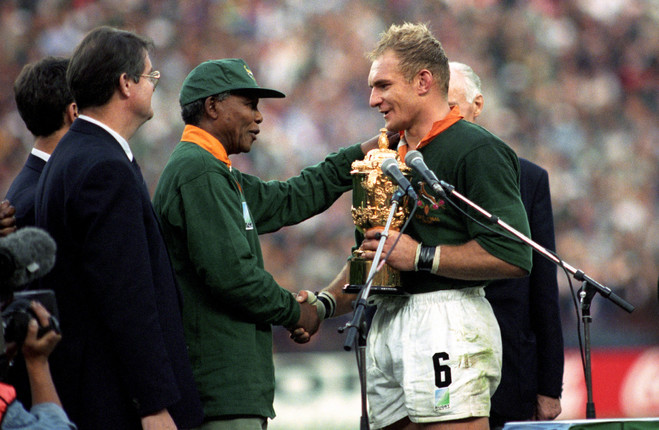LAST UPDATE | 29 Jun 2021
THIS WEEK’S GUEST on Behind the Lines is BBC Scotland Chief Sportswriter Tom English, co-author with Peter Burns of a new book on the 1997 Lions tour of South Africa titled, This is Your Everest.
- The full conversation with Tom is now available to listen to, so to get access to it along with the full 82-episode Behind the Lines archive, subscribe at members.the42.ie. And for a limited time, you can get €5 off an annual membership by using the promo code BTL.
The book is as revelatory about the hosts as the tourists, as the authors dig deep into just how transient the famous 1995 image of Nelson Mandela, Francois Pienaar and the William Webb Ellis trophy proved to be.
“The narrative in 1995 was that it was the victory that united a nation”, says Tom on Behind the Lines. ”It did no such thing. It might have done so for a day or a week, but by 1996 South Africa was as divided as ever, and in a most poisonous way. All sorts of things were happening. Racism was back to pre-’95 levels and a lot of it was tied up into rugby.
“We start the book with the story of Daniel Bongane, a farm labourer who was accused of stealing a few rand – the equivalent of about 15 quid – and he was beaten to death by the owners of the farm, Henry Tromp and his father.
“Henry Tromp was a very promising front row forward, and he did a few months for the murder. But he was subsequently capped by the Springboks in 1996, and played against the Lions in a provincial game in 1997.”
That Tromp was capped in 1996 and that Pienaar was not captured the dysfunction that engulfed the Springboks so shortly after their famous World Cup triumph.
“It was a poisonous time. Pienaar fell out of Louis Luyt, the high priest of South African rugby, A horrible piece of work, really, but a legend of the time. They fell out over various things, one of them money. Pienaar wanted – and got – better deals for the Springboks who won the World Cup.
“Louis didn’t like that he was forced to part with a lot of cash. The coach, Andre Markgraaff, was very much a Luyt appointment, but he was undone when a former player of his secretly recorded him making racist comments. So he had to resign.
“Margkraff and Pienaar fell out, and Pienaar was in exile. He came to Saracens and never played for the Springboks again.
“You had financial disputes within the Springboks, you had racial tensions in the Springboks, you had a return to the era in which black South Africans were cheering on the Springboks’ opponents. It was so divisive.”
So given subsequent events, does the image of Mandela and Pienaar lose its power?
“It was an amazing image, an extraordinary image. Here was Nelson Mandela, who was in prison in 1974 when the Lions beat South Africa, listening to the live commentary via the transistor radio of his prison guards and cheering for the Lions.
“And now, here he comes onto the pitch post-match in a Springbok jersey. That’s an extraordinary image in itself given the history. He was eulogised by the home crowd, many of whom would have been delighted to have seen him in prison.
“I wasn’t there but I know reporters who were very moved by the scene, and probably thought, ‘We are witnessing history here, a nation’s history being changed.’ But it was a bit of a myth. I am not dismissive of the image because it was unbelievably powerful. But it just didn’t last.”
The present Springbok side are a better representation of their nation, says Tom.
“Without a doubt. There are a lot of black South Africans in the team; the captain is black. What Rassie Erasmus and Jacques Nienaber have done is just incredible, to unite that whole team. It is a team for all of South Africa. The team that won the World Cup in 2007 had some but not many black players. This team is the most representative, and the most powerful.
“Even though the ’95 team will forever be cherished, I think the current world champions are a greater reflection of what has happened.
Listen to the full interview with Tom by subscribing at members.the42.ie.


